RBS 2012 Annual Report Download - page 516
Download and view the complete annual report
Please find page 516 of the 2012 RBS annual report below. You can navigate through the pages in the report by either clicking on the pages listed below, or by using the keyword search tool below to find specific information within the annual report.-
 1
1 -
 2
2 -
 3
3 -
 4
4 -
 5
5 -
 6
6 -
 7
7 -
 8
8 -
 9
9 -
 10
10 -
 11
11 -
 12
12 -
 13
13 -
 14
14 -
 15
15 -
 16
16 -
 17
17 -
 18
18 -
 19
19 -
 20
20 -
 21
21 -
 22
22 -
 23
23 -
 24
24 -
 25
25 -
 26
26 -
 27
27 -
 28
28 -
 29
29 -
 30
30 -
 31
31 -
 32
32 -
 33
33 -
 34
34 -
 35
35 -
 36
36 -
 37
37 -
 38
38 -
 39
39 -
 40
40 -
 41
41 -
 42
42 -
 43
43 -
 44
44 -
 45
45 -
 46
46 -
 47
47 -
 48
48 -
 49
49 -
 50
50 -
 51
51 -
 52
52 -
 53
53 -
 54
54 -
 55
55 -
 56
56 -
 57
57 -
 58
58 -
 59
59 -
 60
60 -
 61
61 -
 62
62 -
 63
63 -
 64
64 -
 65
65 -
 66
66 -
 67
67 -
 68
68 -
 69
69 -
 70
70 -
 71
71 -
 72
72 -
 73
73 -
 74
74 -
 75
75 -
 76
76 -
 77
77 -
 78
78 -
 79
79 -
 80
80 -
 81
81 -
 82
82 -
 83
83 -
 84
84 -
 85
85 -
 86
86 -
 87
87 -
 88
88 -
 89
89 -
 90
90 -
 91
91 -
 92
92 -
 93
93 -
 94
94 -
 95
95 -
 96
96 -
 97
97 -
 98
98 -
 99
99 -
 100
100 -
 101
101 -
 102
102 -
 103
103 -
 104
104 -
 105
105 -
 106
106 -
 107
107 -
 108
108 -
 109
109 -
 110
110 -
 111
111 -
 112
112 -
 113
113 -
 114
114 -
 115
115 -
 116
116 -
 117
117 -
 118
118 -
 119
119 -
 120
120 -
 121
121 -
 122
122 -
 123
123 -
 124
124 -
 125
125 -
 126
126 -
 127
127 -
 128
128 -
 129
129 -
 130
130 -
 131
131 -
 132
132 -
 133
133 -
 134
134 -
 135
135 -
 136
136 -
 137
137 -
 138
138 -
 139
139 -
 140
140 -
 141
141 -
 142
142 -
 143
143 -
 144
144 -
 145
145 -
 146
146 -
 147
147 -
 148
148 -
 149
149 -
 150
150 -
 151
151 -
 152
152 -
 153
153 -
 154
154 -
 155
155 -
 156
156 -
 157
157 -
 158
158 -
 159
159 -
 160
160 -
 161
161 -
 162
162 -
 163
163 -
 164
164 -
 165
165 -
 166
166 -
 167
167 -
 168
168 -
 169
169 -
 170
170 -
 171
171 -
 172
172 -
 173
173 -
 174
174 -
 175
175 -
 176
176 -
 177
177 -
 178
178 -
 179
179 -
 180
180 -
 181
181 -
 182
182 -
 183
183 -
 184
184 -
 185
185 -
 186
186 -
 187
187 -
 188
188 -
 189
189 -
 190
190 -
 191
191 -
 192
192 -
 193
193 -
 194
194 -
 195
195 -
 196
196 -
 197
197 -
 198
198 -
 199
199 -
 200
200 -
 201
201 -
 202
202 -
 203
203 -
 204
204 -
 205
205 -
 206
206 -
 207
207 -
 208
208 -
 209
209 -
 210
210 -
 211
211 -
 212
212 -
 213
213 -
 214
214 -
 215
215 -
 216
216 -
 217
217 -
 218
218 -
 219
219 -
 220
220 -
 221
221 -
 222
222 -
 223
223 -
 224
224 -
 225
225 -
 226
226 -
 227
227 -
 228
228 -
 229
229 -
 230
230 -
 231
231 -
 232
232 -
 233
233 -
 234
234 -
 235
235 -
 236
236 -
 237
237 -
 238
238 -
 239
239 -
 240
240 -
 241
241 -
 242
242 -
 243
243 -
 244
244 -
 245
245 -
 246
246 -
 247
247 -
 248
248 -
 249
249 -
 250
250 -
 251
251 -
 252
252 -
 253
253 -
 254
254 -
 255
255 -
 256
256 -
 257
257 -
 258
258 -
 259
259 -
 260
260 -
 261
261 -
 262
262 -
 263
263 -
 264
264 -
 265
265 -
 266
266 -
 267
267 -
 268
268 -
 269
269 -
 270
270 -
 271
271 -
 272
272 -
 273
273 -
 274
274 -
 275
275 -
 276
276 -
 277
277 -
 278
278 -
 279
279 -
 280
280 -
 281
281 -
 282
282 -
 283
283 -
 284
284 -
 285
285 -
 286
286 -
 287
287 -
 288
288 -
 289
289 -
 290
290 -
 291
291 -
 292
292 -
 293
293 -
 294
294 -
 295
295 -
 296
296 -
 297
297 -
 298
298 -
 299
299 -
 300
300 -
 301
301 -
 302
302 -
 303
303 -
 304
304 -
 305
305 -
 306
306 -
 307
307 -
 308
308 -
 309
309 -
 310
310 -
 311
311 -
 312
312 -
 313
313 -
 314
314 -
 315
315 -
 316
316 -
 317
317 -
 318
318 -
 319
319 -
 320
320 -
 321
321 -
 322
322 -
 323
323 -
 324
324 -
 325
325 -
 326
326 -
 327
327 -
 328
328 -
 329
329 -
 330
330 -
 331
331 -
 332
332 -
 333
333 -
 334
334 -
 335
335 -
 336
336 -
 337
337 -
 338
338 -
 339
339 -
 340
340 -
 341
341 -
 342
342 -
 343
343 -
 344
344 -
 345
345 -
 346
346 -
 347
347 -
 348
348 -
 349
349 -
 350
350 -
 351
351 -
 352
352 -
 353
353 -
 354
354 -
 355
355 -
 356
356 -
 357
357 -
 358
358 -
 359
359 -
 360
360 -
 361
361 -
 362
362 -
 363
363 -
 364
364 -
 365
365 -
 366
366 -
 367
367 -
 368
368 -
 369
369 -
 370
370 -
 371
371 -
 372
372 -
 373
373 -
 374
374 -
 375
375 -
 376
376 -
 377
377 -
 378
378 -
 379
379 -
 380
380 -
 381
381 -
 382
382 -
 383
383 -
 384
384 -
 385
385 -
 386
386 -
 387
387 -
 388
388 -
 389
389 -
 390
390 -
 391
391 -
 392
392 -
 393
393 -
 394
394 -
 395
395 -
 396
396 -
 397
397 -
 398
398 -
 399
399 -
 400
400 -
 401
401 -
 402
402 -
 403
403 -
 404
404 -
 405
405 -
 406
406 -
 407
407 -
 408
408 -
 409
409 -
 410
410 -
 411
411 -
 412
412 -
 413
413 -
 414
414 -
 415
415 -
 416
416 -
 417
417 -
 418
418 -
 419
419 -
 420
420 -
 421
421 -
 422
422 -
 423
423 -
 424
424 -
 425
425 -
 426
426 -
 427
427 -
 428
428 -
 429
429 -
 430
430 -
 431
431 -
 432
432 -
 433
433 -
 434
434 -
 435
435 -
 436
436 -
 437
437 -
 438
438 -
 439
439 -
 440
440 -
 441
441 -
 442
442 -
 443
443 -
 444
444 -
 445
445 -
 446
446 -
 447
447 -
 448
448 -
 449
449 -
 450
450 -
 451
451 -
 452
452 -
 453
453 -
 454
454 -
 455
455 -
 456
456 -
 457
457 -
 458
458 -
 459
459 -
 460
460 -
 461
461 -
 462
462 -
 463
463 -
 464
464 -
 465
465 -
 466
466 -
 467
467 -
 468
468 -
 469
469 -
 470
470 -
 471
471 -
 472
472 -
 473
473 -
 474
474 -
 475
475 -
 476
476 -
 477
477 -
 478
478 -
 479
479 -
 480
480 -
 481
481 -
 482
482 -
 483
483 -
 484
484 -
 485
485 -
 486
486 -
 487
487 -
 488
488 -
 489
489 -
 490
490 -
 491
491 -
 492
492 -
 493
493 -
 494
494 -
 495
495 -
 496
496 -
 497
497 -
 498
498 -
 499
499 -
 500
500 -
 501
501 -
 502
502 -
 503
503 -
 504
504 -
 505
505 -
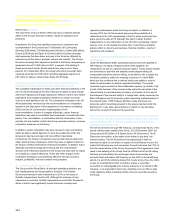 506
506 -
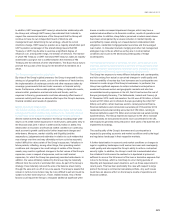 507
507 -
 508
508 -
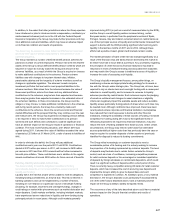 509
509 -
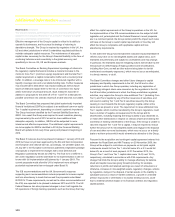 510
510 -
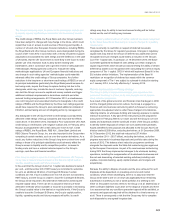 511
511 -
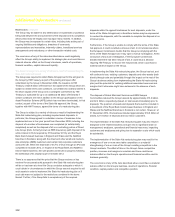 512
512 -
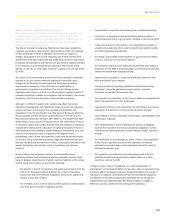 513
513 -
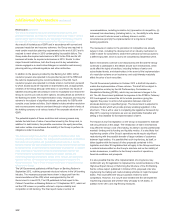 514
514 -
 515
515 -
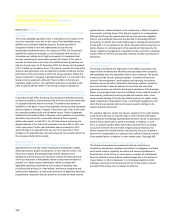 516
516 -
 517
517 -
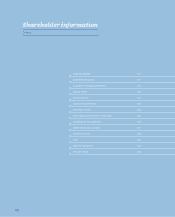 518
518 -
 519
519 -
 520
520 -
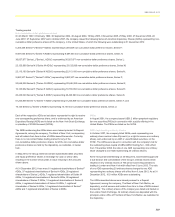 521
521 -
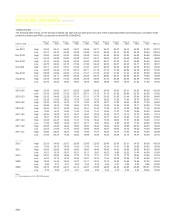 522
522 -
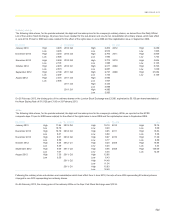 523
523 -
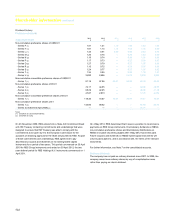 524
524 -
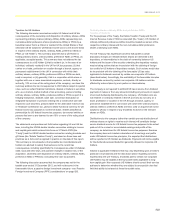 525
525 -
 526
526 -
 527
527 -
 528
528 -
 529
529 -
 530
530 -
 531
531 -
 532
532 -
 533
533 -
 534
534 -
 535
535 -
 536
536 -
 537
537 -
 538
538 -
 539
539 -
 540
540 -
 541
541 -
 542
542 -
 543
543
 |
 |

514
Additional information continued
Risk factors continued
The Group’s results could be adversely affected in the event of goodwill
impairment
The Group capitalises goodwill, which is calculated as the excess of the
cost of an acquisition over the net fair value of the identifiable assets,
liabilities and contingent liabilities acquired. Acquired goodwill is
recognised initially at cost and subsequently at cost less any
accumulated impairment losses. As required by IFRS, the Group tests
goodwill for impairment annually, or more frequently when events or
circumstances indicate that it might be impaired. An impairment test
involves comparing the recoverable amount (the higher of the value in
use and fair value less cost to sell) of an individual cash generating unit
with its carrying value. At 31 December 2012, the Group carried goodwill
of £11.3 billion on its balance sheet. The value in use and fair value of the
Group’s cash generating units are affected by market conditions and the
performance of the economies in which the Group operates. Where the
Group is required to recognise a goodwill impairment, it is recorded in the
Group’s income statement, although it has no effect on the Group’s
regulatory capital position. Any significant write-down of goodwill could
have a material adverse effect on the Group’s results of operations.
The recoverability of certain deferred tax assets recognised by the Group
depends on the Group’s ability to generate sufficient future taxable profits
In accordance with IFRS, the Group has recognised deferred tax assets
on losses available to relieve future profits from tax only to the extent that
it is probable that they will be recovered. The deferred tax assets are
quantified on the basis of current tax legislation and accounting standards
and are subject to change in respect of the future rates of tax or the rules
for computing taxable profits and allowable losses. Failure to generate
sufficient future taxable profits or changes in tax legislation or accounting
standards may reduce the recoverable amount of the recognised
deferred tax assets. In April 2011, the UK Government commenced a
staged reduction in the rate of UK corporation tax from 28% to 23% over
a four-year period. Further rate reductions were announced in 2012
which will lead to a corporation tax rate of 21% by April 2014. Such
changes in the applicable tax rates will reduce the recoverable amount of
the recognised deferred tax assets.
Operational risks
Operational risks are inherent in the Group’s businesses
Operational risk is the risk of loss resulting from inadequate or failed
internal processes, people and systems, or from external events. The
Group has complex and geographically diverse operations and
operational risk and losses can result from internal and external fraud,
errors by employees or third parties, failure to document transactions
properly or to obtain proper authorisation, failure to comply with
applicable regulatory requirements and conduct of business rules
(including those arising out of anti-bribery, anti-money laundering and
anti-terrorism legislation, as well as the provisions of applicable sanctions
programmes), equipment failures, business continuity and data security
system failures, natural disasters or the inadequacy or failure of systems
and controls, including those of the Group’s suppliers or counterparties.
Although the Group has implemented risk controls and loss mitigation
actions, and substantial resources are devoted to developing efficient
procedures, to identify and rectify weaknesses in existing procedures and
to train staff, it is not possible to be certain that such actions have been or
will be effective in controlling each of the operational risks faced by the
Group. Ineffective management of operational risks could have a material
adverse effect on the Group’s business, financial condition and results of
operations.
The Group’s operations are highly dependent on its information
technology systems
The Group’s operations are dependent on the ability to process a very
large number of transactions efficiently and accurately while complying
with applicable laws and regulations where it does business. The proper
functioning of the Group’s payment systems, financial and sanctions
controls, risk management, credit analysis and reporting, accounting,
customer service and other information technology systems, as well as
the communication networks between its branches and main data
processing centres, are critical to the Group’s operations. Critical system
failure, any prolonged loss of service availability or any material breach of
data security, particularly involving confidential customer data, could
cause serious damage to the Group’s ability to service its clients, could
result in significant compensation costs, could breach regulations under
which the Group operates and could cause long-term damage to the
Group’s business and brand.
For example, failure to protect the Group’s operations from cyber attacks
could result in the loss of customer data or other sensitive information.
The threats are increasingly sophisticated and there can be no assurance
that the Group will be able to prevent all threats. In addition, in June
2012, a computer system failure prevented customers from accessing
accounts in both the UK and Ireland. Ongoing issues relating to the
failure continued for several months, requiring the Group to set aside a
provision for compensation to customers who suffered losses as a result
of the system failure, in addition to other related costs. See page 430.
The Group may suffer losses due to employee misconduct
The Group’s businesses are exposed to risk from potential non-
compliance with policies, employee misconduct or negligence and fraud,
which could result in regulatory sanctions and serious reputational or
financial harm to the Group. In recent years, a number of multinational
financial institutions have suffered material losses due to the actions of
‘rogue traders’ or other employees. It is not always possible to deter
employee misconduct and the precautions the Group takes to prevent
and detect this activity may not always be effective.
